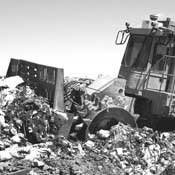With Mississippi outpacing other states when it comes to using electricity, a little creativity is necessary to keep up with demand. Increasingly, that means supplementing traditional hydro, coal and nuclear power with other forms of renewables-driven electricity powered by the sun, wind and even garbage.
Yes, garbage. Most people don't realize that their neighborhood landfill has been producing energy for years. Decomposing organic matter releases a medley of gases, including methane, the principal component of natural gas. Typically, landfill operators burn off the methane to prevent the highly combustible and potent greenhouse gas from escaping into the atmosphere. Landfill owners can also capture and convert the methane to electric power for the landfill to use, or they can sell the power on the open electricity market.
The argument that landfill gas-to-electricity can reduce both greenhouse gas emissions and energy consumption has not kept detractors from dumping on the idea. While the federal government and most states consider landfill gas to be a renewable resource, critics argue that such projects are not sustainable because they rely on the existence of waste dumps. Others wonder whether the small amount of electricity that landfills produce justifies the hefty price tag of the generating units.
"Landfills are things that we unfortunately need. There is going to be landfill gas that's generated, and we need to be able to beneficially use those emissions rather than just flaring them off," said Mark Williams, an administrator with the Mississippi Department of Environmental Quality's solid waste management program.
The use of methane-powered electricity generators has increased in recent years due to the prospect of making a profit from something that would otherwise go to waste, plus the added benefit of reducing the global-warming impact of landfill methane. The units belched 40 percent more electricity in 2008 compared to 2004, the Energy Information Agency reports.
As of summer 2011, the U.S. Environmental Protection Agency reports 558 landfills participating in its landfill methane outreach program. Together, these units can produce up to 1.7 gigawatts (1,700 megawatts) of electricity. Another 510 landfill sites, capable of generating 1.1 gigawatts of electric power, are also in the pipeline.
By comparison, an Entergy-owned natural gas combined-cycle facility in Hinds County produces up to 520 megawatts; the proposed lignite coal plant in Kemper County will generate 582 megawatts of power.
Mississippi's first commercial landfill-gas methane generator came online in October when Starkville-based Golden Triangle Regional Solid Waste Management Authority fired up its 1-megawatt unit, which is the amount of juice needed to power about 700 homes. The Mississippi Department of Environmental Quality is considering another dozen sites around the state, including the Little Dixie Landfill, located in Ridgeland and owned by BFI Waste Systems of North America, for future projects.
The U.S. Energy Department provided the Golden Triangle authority with a $310,000 grant to help purchase the generator.
The Tennessee Valley Authority, a federally owned utility company, agreed to purchase the renewable power for 3 cents per kilowatt over the retail price.
Louie Miller, state director of the Mississippi Sierra Club, questioned whether the Mississippi project would have come to fruition without federal funds but said that converting the methane to electricity is better than flaring it off.
"From the standpoint of utilizing an unutilized resource, I think it's probably a good idea, but I think the jury is still out on whether this is sustainable," Miller said.
It might also be a good idea from the standpoint of growing energy demand in the state and waste disposal overall. Between 1980 and 2005, Mississippi's electricity consumption grew 2.6 percent each year compared to 2.2 percent for the rest of the United States. Meanwhile, Americans generate approximately 250 million tons of rubbish each year.
Even though microorganisms from decaying food could potentially become beneficial electricity someday, Williams stressed that composting organic material is still better than putting it in the garbage.
"Where disposal has to occur, if there are benefits to using the emissions or discharges from the landfills, we want to take advantage of those," he said.
Comment at http://www.jfp.ms.



Comments
Use the comment form below to begin a discussion about this content.